Surah Nuh in English Transliteration is the 71st chapter of the Holy Quran, and it has 28 verses. Named after Prophet Nuh (Noah), it focuses on his message to his people, urging them to worship Allah alone, and explains his efforts to guide them to the right path. The surah is a powerful reminder of persistence, patience, and faith in the face of adversity. Surah Nuh emphasizes Allah’s mercy and guidance and serves as a lesson on obedience, humility, and seeking forgiveness.
In this article, we’ll present Surah Nuh in transliteration to help with pronunciation, its full translation, and the various benefits of reciting this surah. You will also learn how to memorize it with ease and access our free Quran resources to improve your Quranic knowledge.
What is Surah Nuh in English Transliteration?
Surah Nuh is a Meccan surah that recounts the story of Prophet Nuh (Noah) and his unrelenting efforts to call his people to Allah. Despite his continued invitations, his people rejected the truth, which led to consequences as they ignored divine guidance. This chapter serves as a timeless lesson in patience, perseverance, and the importance of belief in Allah.
Surah Nuh:
Surah Nuh teaches resilience through faith and persistence in prayer.
Let it inspire you to keep calling upon Allah no matter what.

Come back anytime to Arabic-OM.com for more timeless lessons.
Surah Nuh in English Transliteration
Here is Surah Nuh in transliteration to help you pronounce it accurately:
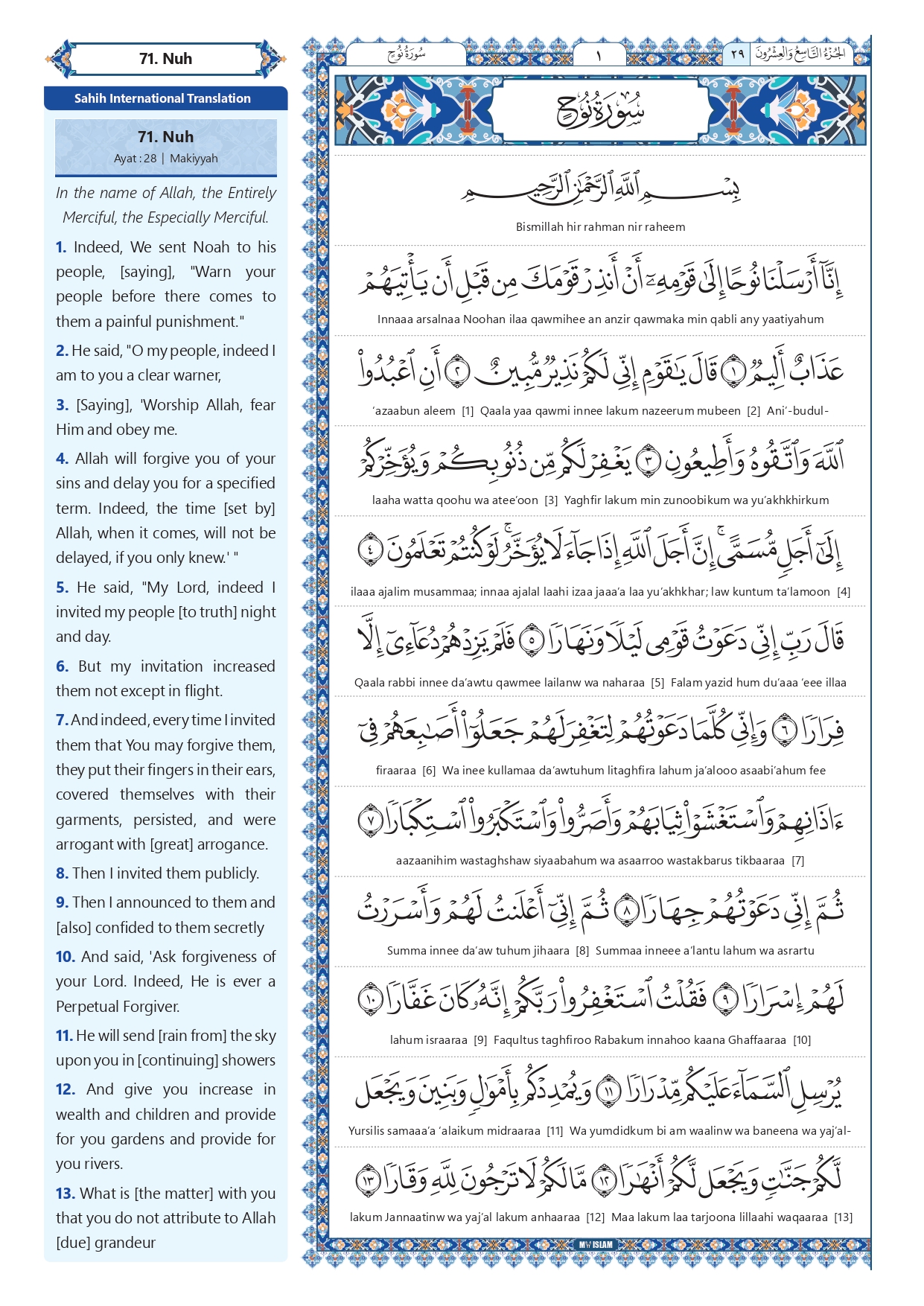
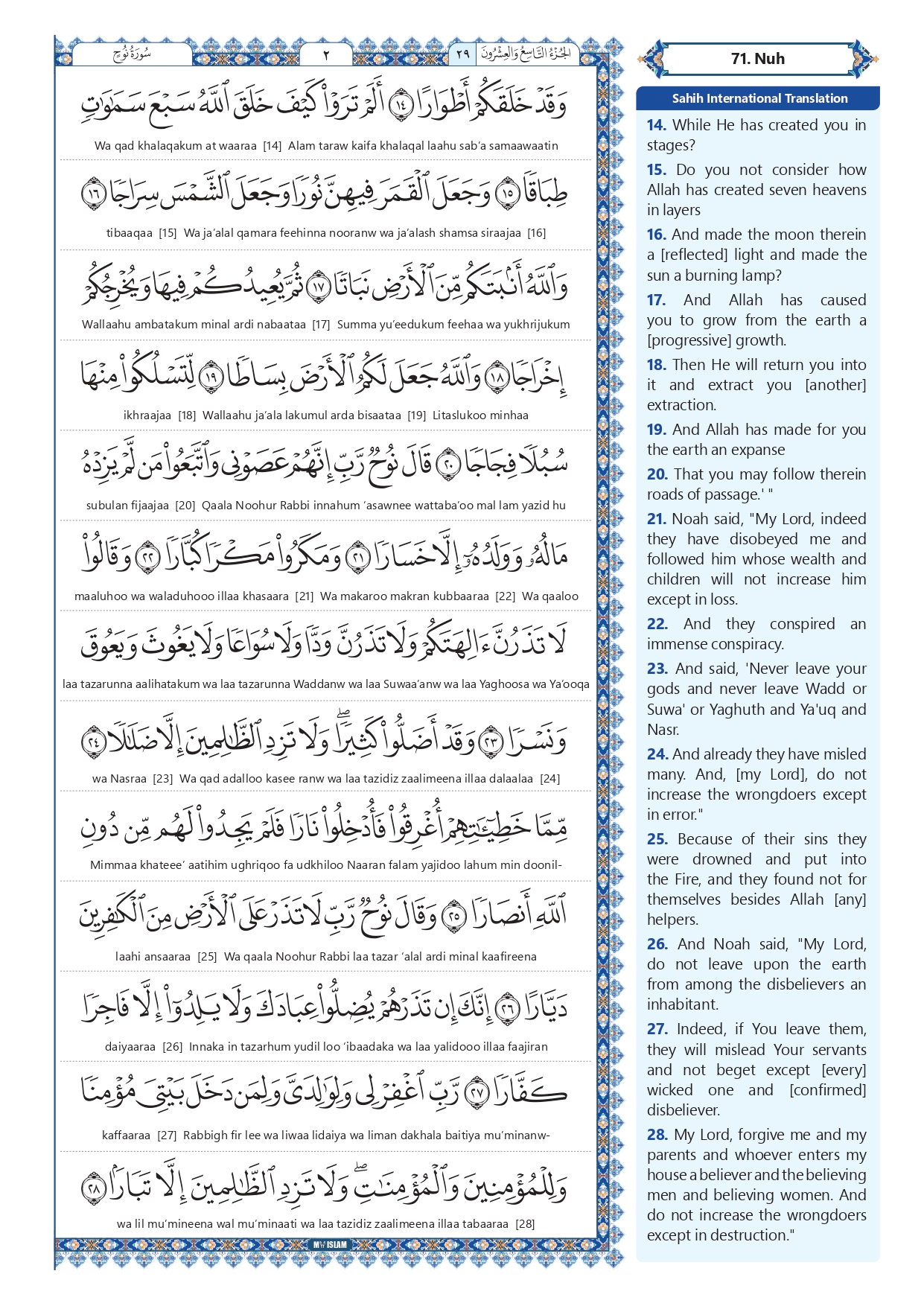
Surah Nuh in English Transliteration text
A’uthu billahi min ash-shaytan ir-rajim
- Bismillahir Rahmanir Raheem
- إِنَّا أَرْسَلْنَا نُوحًا إِلَىٰ قَوْمِهِ أَنْ أَنْذِرْ قَوْمَكَ مِنْ قَبْلِ أَنْ يَأْتِيَهُمْ عَذَابٌ أَلِيمٌ
Inna arsalna Noohan ila qawmihi an andhir qawmaka min qabli an ya’tiyahum ‘adhabun aleem - قَالَ يَا قَوْمِ إِنِّي لَكُمْ نَذِيرٌ مُّبِينٌ
Qala ya qawmi innee lakum natheerun mubeen - أَنِ اعْبُدُوا اللَّهَ وَاتَّقُوهُ وَأَطِيعُونِ
Ani’budu Allaha wattaqoohu wa attee’oon - يَغْفِرْ لَكُمْ مِّنْ ذُنُوبِكُمْ وَيُؤَخِّرْكُمْ إِلَىٰ أَجَلٍ مُّسَمًّى إِنَّ أَجَلَ اللَّهِ إِذَا جَاءَ لَا يُؤَخَّرُ لَوْ كُنتُمْ تَعْلَمُونَ
Yaghfir lakum min dhunoobikum wa yu’akhkhirkum ila ajalin musamman inna ajala Allahi itha ja’a la yu’akhkhar law kuntum ta’lamoon - قَالَ رَبِّ إِنِّي دَعَوْتُ قَوْمِي لَيْلًا وَنَهَارًا
Qala rabbi innee da’awtu qawmi laylan wa nahara - فَلَمْ يَزِدْهُمْ دُعَائِي إِلَّا فِرَارًا
Falam yazidhum du’aae illa firara - وَإِنِّي كُلَّمَا دَعَوْتُهُمْ لِتَغْفِرَ لَهُمْ جَعَلُوا أَصَابِعَهُمْ فِي آذَانِهِمْ وَاسْتَغْشَوْا ثِيَابَهُمْ وَأَصَرُّوا وَاسْتَكْبَرُوا اسْتِكْبَارًا
Wa innee kullama da’autuhum litaghfir lahum ja’aloo asabi’ahum fee aadhanihim wastaghshaw thiyabahum wa asarru wastakbaru istikbara - ثُمَّ إِنِّي دَعَوْتُهُمْ جِهَارًا
Thumma innee da’autuhum jihara - ثُمَّ إِنِّي أَعْلَنتُ لَهُمْ وَأَسْرَرْتُ لَهُمْ إِسْرَارًا
Thumma innee a’lantu lahum wa asrartu lahum israra - فَقُلْتُ اسْتَغْفِرُوا رَبَّكُمْ إِنَّهُ كَانَ غَفَّارًا
Faqultu istaghfiroo rabbakum innahu kana ghaffara - يُرْسِلِ السَّمَاءَ عَلَيْكُم مِّدْرَارًا
Yursili assamaa’a ‘alaykum midrara - وَيُمْدِدْكُم بِأَمْوَالٍ وَبَنِينَ وَيَجْعَل لَّكُمْ جَنَّاتٍ وَيَجْعَل لَّكُمْ أَنْهَارًا
Wa yumdidkum bi-amwalin wa baneena wa yaj’al lakum jannatin wa yaj’al lakum anhara - مَّا لَكُمْ لَا تَرْجُونَ لِلَّهِ وَقَارًا
Ma lakum la tarjoona lillahi waqara - وَقَدْ خَلَقَكُمْ أَطْوَارًا
Waqad khalaqakum atwara - أَلَمْ تَرَوْا كَيْفَ خَلَقَ اللَّهُ سَبْعَ سَمَاوَاتٍ طِبَاقًا
Alam taraw kayfa khalaqa Allaha sab’a samawatin tibaqa - وَجَعَلَ الْقَمَرَ فِيهِنَّ نُورًا وَجَعَلَ الشَّمْسَ سِرَاجًا
Waja’al al-qamara feehinna nooran waja’al ash-shamsa siraja - وَاللَّهُ أَنبَتَكُم مِّنَ الْأَرْضِ نَبَاتًا
Wallahu anbatakum mina al-ardi nabata - ثُمَّ يُعِيدُكُمْ فِيهَا وَيُخْرِجُكُمْ إِخْرَاجًا
Thumma yu’eedukum feeha wa yukhrijukum ikhraja - وَاللَّهُ جَعَلَ لَكُمُ الْأَرْضَ بِسَاطًا
Wallahu ja’ala lakumu al-arda bisata - لِتَسْلُكُوا مِنْهَا سُبُلًا فِجَاجًا
Litasluku minha subulan fijaja - قَالَ نُوحٌ رَّبِّ إِنَّهُمْ عَصَوْنِي وَاتَّبَعُوا مَن لَّمْ يَزِدْهُ مَالُهُ وَوَلَدُهُ إِلَّا خَسَارًا
Qala Noohun rabbi innahum ‘asawnee wa attaba’u man lam yazid-hu maluhu wa waladuhu illa khasara - وَمَكَرُوا مَكْرًا كُبَّارًا
Wa makaroo makran kubbara - وَقَالُوا لَا تَذَرُنَّ آلِهَتَكُمْ وَلَا تَذَرُنَّ وَدًّا وَلَا سُوَاعًا وَلَا يَغُوثَ وَيَعُوقَ وَنَسْرًا
Waqaloo la tadhurunna alihatakum wa la tadhurunna waddan wala suwa’an wala yaghootha wa ya’ooqa wa nasra - وَقَدْ أَضَلُّوا كَثِيرًا ۖ وَلَا تَزِدِ الظَّالِمِينَ إِلَّا ضَلَالًا
Waqad adallu katheeran wa la tazid al-dhalimeen illa dalala - مِّمَّا خَطِيئَاتِهِمْ أُغْرِقُوا فَأُدْخِلُوا نَارًا فَلَمْ يَجِدُوا لَهُم مِّن دُونِ اللَّهِ أَنصَارًا
Mimma khatee-aatihim ughriqoo fa’udkhiloo naran fa lam yajidoo lahum min doonillahi ansara - وَقَالَ نُوحٌ رَّبِّ لَا تَذَرْ عَلَى الْأَرْضِ مِنَ الْكَافِرِينَ دَيَّارًا
Wa qala Noohun rabbi la tadhar alal-ardi minal kafireena dayyara - إِنَّكَ إِن تَذَرْهُمْ يُضِلُّوا عِبَادَكَ وَلَا يَلِدُوا إِلَّا فَاجِرًا كَفَّارًا
Inna-ka in tadhar-hum yudillu ‘ibadaka wa la yalidoo illa fajiran kaffara - رَّبِّ اغْفِرْ لِي وَلِوَالِدَيَّ وَلِمَن دَخَلَ بَيْتِيَ مُؤْمِنًا وَلِلْمُؤْمِنِينَ وَالْمُؤْمِنَاتِ وَلَا تَزِدِ الظَّالِمِينَ إِلَّا تَبَارًا
Rabbi ighfir lee wa li walidayya wa li man dakhala baytiya mu’minan wa lil mu’mineena wal mu’minat wa la tazid al-dhalimeen illa tabara
- إِنَّا أَرْسَلْنَا نُوحًا إِلَىٰ قَوْمِهِ أَنْ أَنْذِرْ قَوْمَكَ مِنْ قَبْلِ أَنْ يَأْتِيَهُمْ عَذَابٌ أَلِيمٌ
Translation of Surah Nuh
- Indeed, We sent Noah to his people, [saying], “Warn your people before there comes to them a painful punishment.”
- He said, “O my people, indeed I am to you a clear warner,
- [Saying], ‘Worship Allah, fear Him, and obey me.
- Allah will forgive you of your sins and delay you for a specified term. Indeed, the time [set by] Allah, when it comes, will not be delayed, if you only knew.’ “
- He said, “My Lord, indeed I invited my people [to truth] night and day.
- But my invitation increased them not except in flight.
- And indeed, every time I invited them that You may forgive them, they put their fingers in their ears, covered themselves with their garments, persisted, and were arrogant with [great] arrogance.
- Then I invited them publicly.
- Then I announced to them and [also] confided to them secretly
- And said, ‘Ask forgiveness of your Lord. Indeed, He is ever a Perpetual Forgiver.
- He will send [rain from] the sky upon you in [continuing] showers.
- And give you increase in wealth and children and provide for you gardens and provide for you rivers…
(Continue with the translation of the full surah)
Benefits of Reciting Surah Nuh in English Transliteration
- Remembrance of Allah’s Mercy: Regular recitation of Surah Nuh reminds us of Allah’s mercy and His response to the prayers of those who call upon Him sincerely.
- Inspiration for Patience and Persistence: This surah strengthens one’s patience, inspiring resilience in the face of challenges and rejections.
- Encourages Seeking Forgiveness: Surah Nuh teaches the importance of seeking forgiveness, which leads to Allah’s blessings in this life and the next.
How to Memorize Surah Nuh
- Read the Transliteration: Familiarize yourself with the pronunciation using transliteration before moving to Arabic recitation.
- Practice Small Sections: Memorize a few verses daily, reflecting on their meanings to build a deeper connection with the verses.
- Recite Regularly: Consistent recitation reinforces memorization and helps in retaining the verses.
Surah jinn in English Transliteration Meaning, Benefits, and How to Learn 72
Frequently Asked Questions About Surah Nuh in English Transliteration
- What is the message of Surah Nuh in English Transliteration?
Surah Nuh conveys the message of patience, persistence, and the importance of belief in Allah, as demonstrated by Prophet Nuh’s efforts to guide his people. - Why is it important to recite Surah Nuh in English Transliteration?
Reciting Surah Nuh is a reminder of Allah’s mercy and teaches us patience in spreading goodness. - What are the main themes in Surah Nuh in English Transliteration?
Key themes include calling others to Allah, patience, and the significance of seeking forgiveness. - How can I memorize Surah Nuh in English Transliteration effectively?
Start by reading the transliteration, then gradually memorize sections with repetition. - Where was Surah Nuh in English Transliteration revealed?
Surah Nuh is a Meccan surah, revealed in Makkah. - Can reciting Surah Nuh protect me from challenges?
Many believe that consistent recitation of this surah strengthens faith and patience. - Is Surah Nuh beneficial for forgiveness?
Yes, it emphasizes the value of seeking Allah’s forgiveness and the blessings it brings. - How many verses are in Surah Nuh in English Transliteration?
There are 28 verses in Surah Nuh in English Transliteration. - What are the benefits of reciting Surah Nuh regularly?
Regular recitation offers spiritual benefits, reminding one of Allah’s mercy and encouraging patience and forgiveness. - Is there a way to improve my pronunciation for Surah Nuh?
Listening to recorded recitations and practicing the transliteration are effective methods for improving pronunciation.
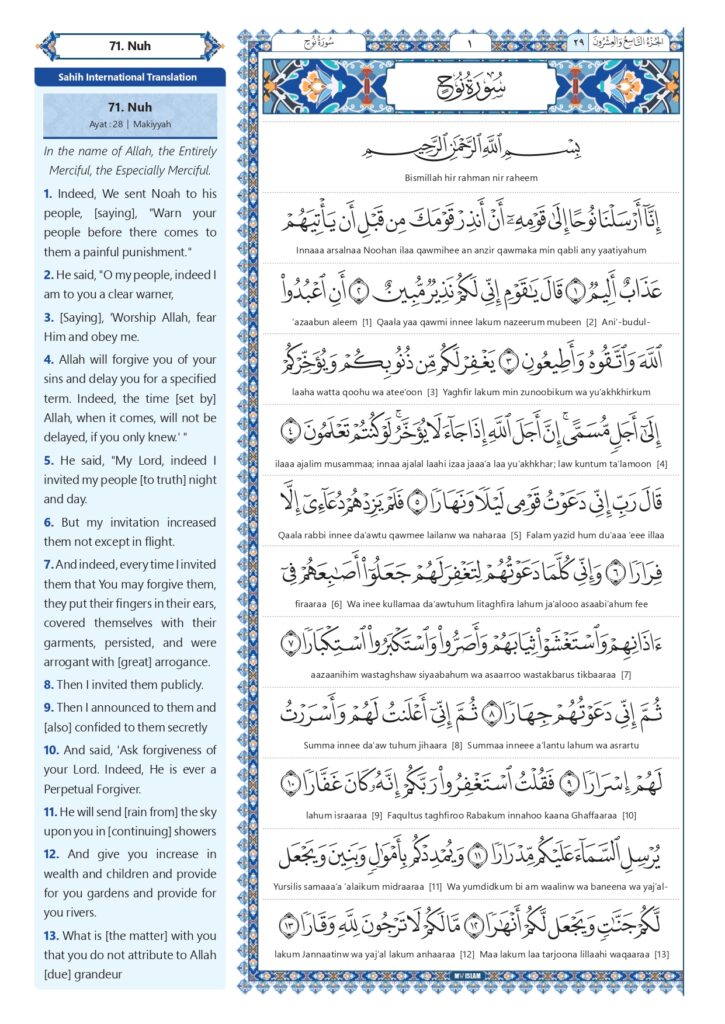

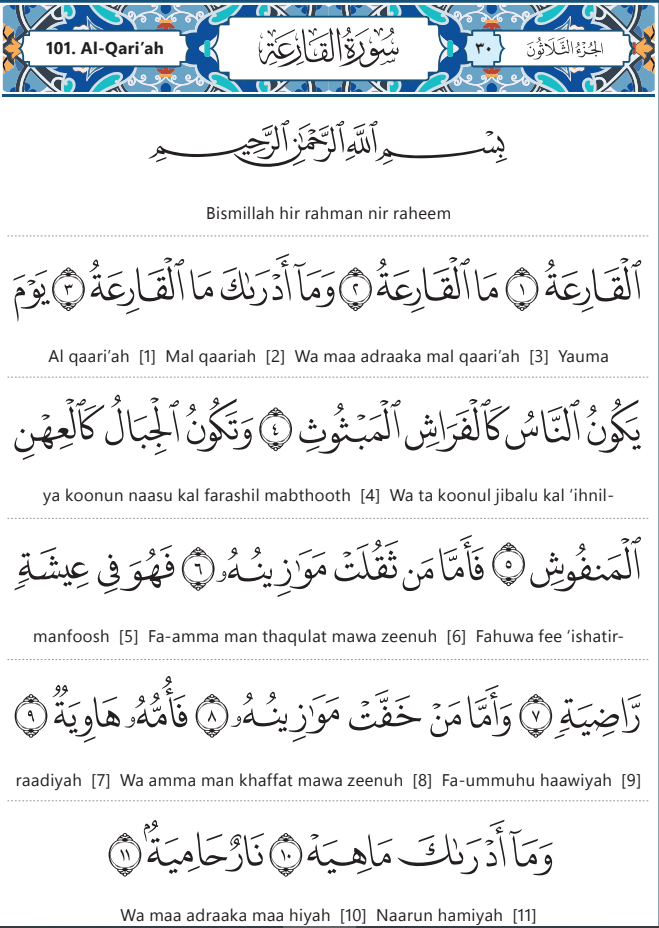
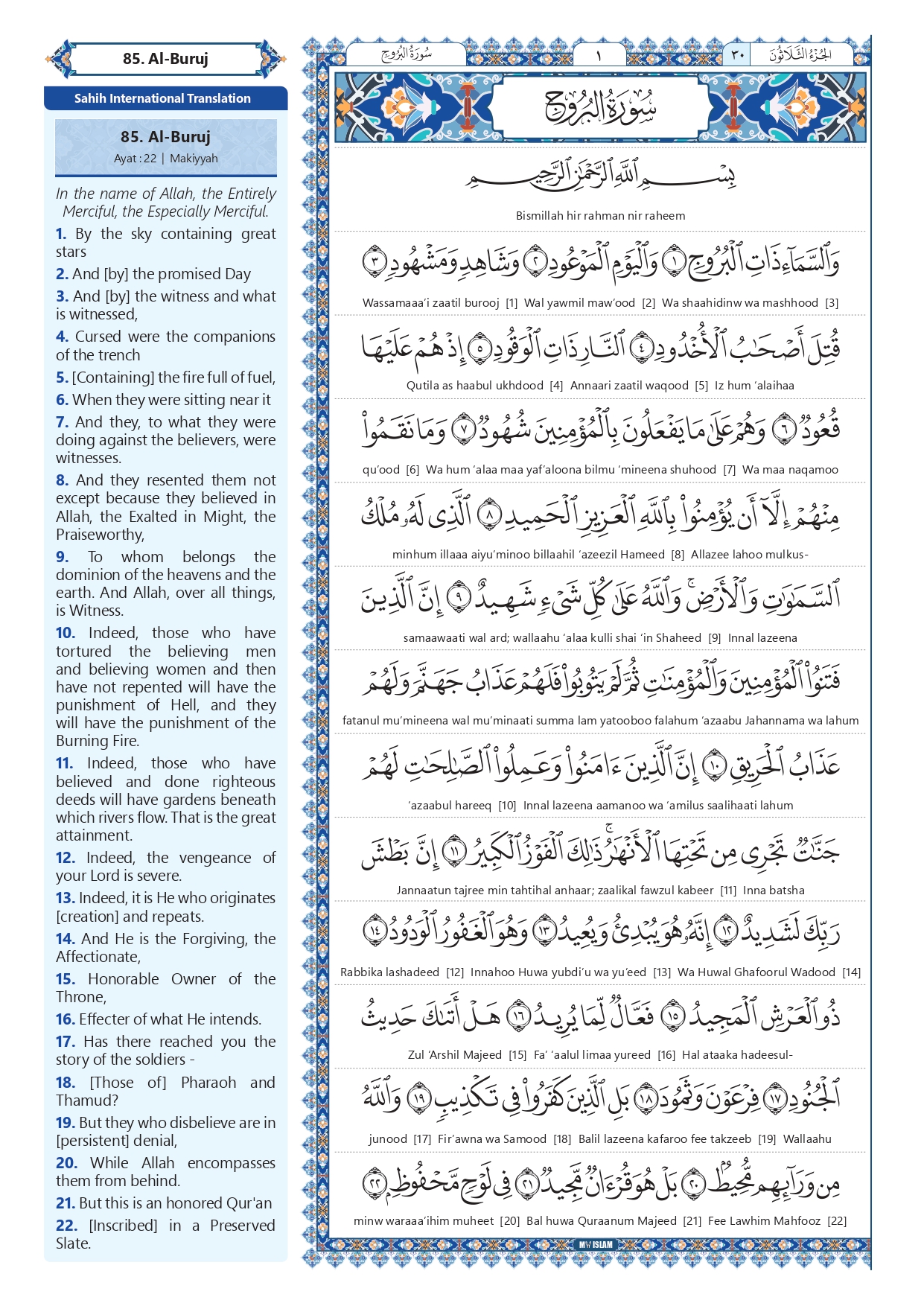
Pingback: Surah Maarij in english transliteration Meaning, Benefits, and How to Learn 70 -